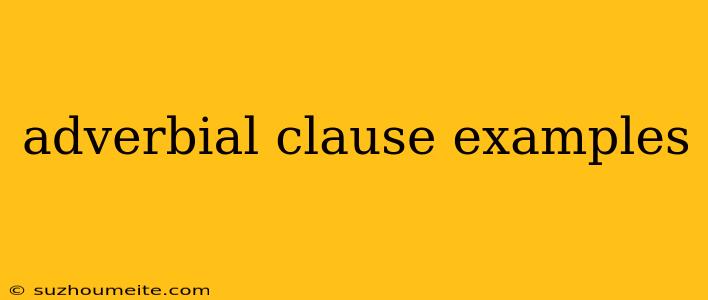Adverbial Clauses: Adding Details to Your Sentences
Adverbial clauses are subordinate clauses that modify verbs, adjectives, or adverbs. They provide additional information about when, where, why, how, to what extent, and under what conditions something happens. In a sentence, they act as adverbs, answering questions about the main verb.
Identifying Adverbial Clauses
Adverbial clauses are typically introduced by subordinating conjunctions. Here are some common examples:
- Time: after, before, as, since, until, when, while
- Place: where, wherever
- Cause: because, since, as
- Condition: if, unless, whether
- Concession: although, though, even though
- Purpose: so that, in order that
- Result: so, so that, such that
Types of Adverbial Clauses
1. Time Clauses: These clauses specify when an action occurs.
- Example: He left the house after the sun had set.
2. Place Clauses: These clauses indicate where an action happens.
- Example: The cat hid under the bed where it felt safe.
3. Cause Clauses: These clauses explain the reason for an action.
- Example: She missed the train because she overslept.
4. Condition Clauses: These clauses state the circumstances under which an action will occur.
- Example: If it rains tomorrow, we'll stay inside.
5. Concession Clauses: These clauses acknowledge a contrast or exception.
- Example: Although he was tired, he continued working.
6. Purpose Clauses: These clauses explain the reason or goal of an action.
- Example: He studied hard so that he could pass the exam.
7. Result Clauses: These clauses describe the consequence of an action.
- Example: He was so tired that he fell asleep immediately.
Example Sentences
Here are some more examples of adverbial clauses in action:
- When I saw him, I waved. (Time)
- Where there's smoke, there's fire. (Place)
- Because he was late, he missed the meeting. (Cause)
- If you work hard, you will succeed. (Condition)
- Although she was nervous, she gave a great presentation. (Concession)
- He practiced every day so that he could improve his skills. (Purpose)
- The movie was so good that I watched it twice. (Result)
Mastering Adverbial Clauses
Understanding adverbial clauses can improve your writing by adding depth and clarity to your sentences. Use them to provide context, highlight connections between ideas, and create a more engaging and informative writing style.
